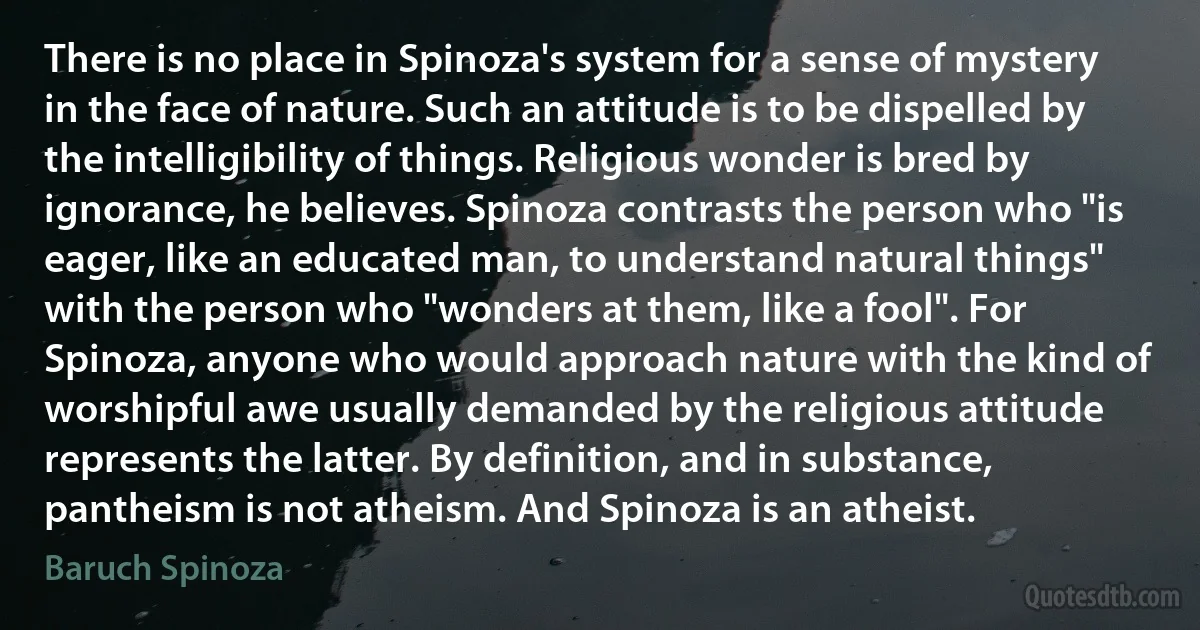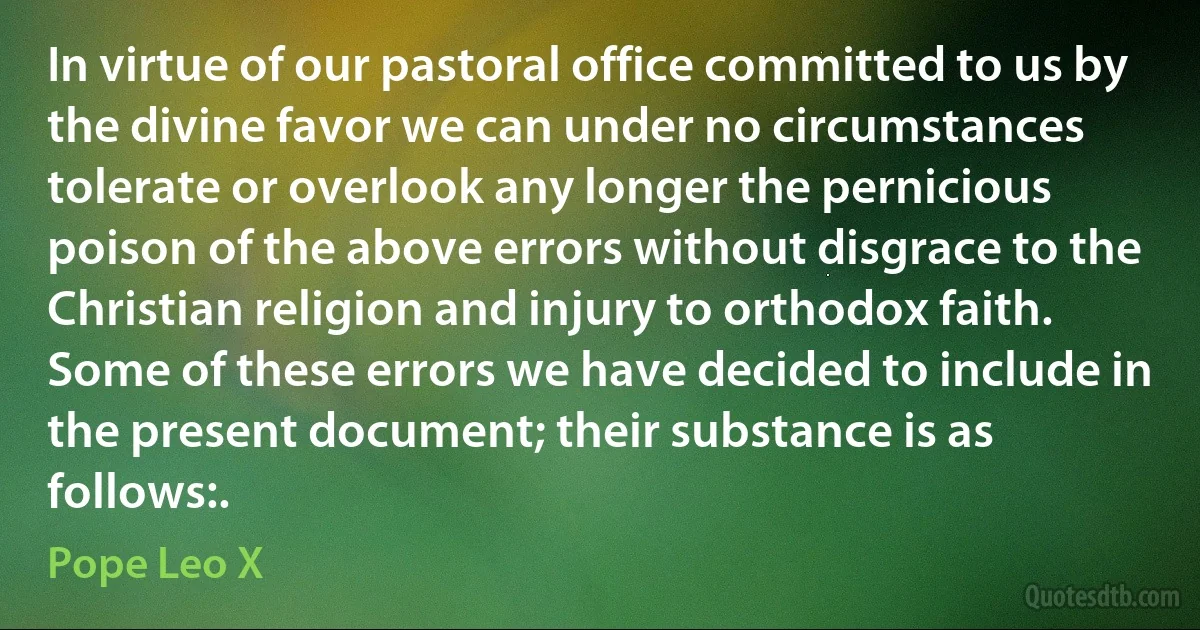Substance Quotes - page 28
He sitteth in our soul.
For it is His good-pleasure to reign in our Understanding blissfully, and sit in our Soul restfully, and to dwell in our Soul endlessly, us all working into Him: in which working He willeth that we be His helpers, giving to Him all our attending, learning His lores, keeping His laws, desiring that all be done that He doeth; truly trusting in Him.
For soothly I saw that our Substance is in God.

Julian of Norwich
Our Substance is our Father, God Almighty, and our Substance is our Mother, God, All-wisdom; and our Substance is in our Lord the Holy Ghost, God All-goodness. For our Substance is whole in each Person of the Trinity, which is one God. And our Sense-soul is only in the Second Person Christ Jesus; in whom is the Father and the Holy Ghost: and in Him and by Him we are mightily taken out of Hell, and out of the wretchedness in Earth worshipfully brought up into Heaven and blissfully oned to our Substance: increased in riches and in nobleness by all the virtues of Christ, and by the grace and working of the Holy Ghost.

Julian of Norwich
From the saints I must take the substance, not the accidents of their virtues. I am not St. Aloysius, nor must I seek holiness in his particular way, but according to the requirements of my own nature, my own character and the different conditions of my life. I must not be the dry, bloodless reproduction of a model, however perfect. God desires us to follow the examples of the saints by absorbing the vital sap of their virtues and turning it into our own life-blood, adapting it to our own individual capacities and particular circumstances. If St. Aloysius had been as I am, he would have become holy in a different way.

Pope John XXIII
The human mind in all countries having gone to the uttermost limit of its own capacity, flushed with its conquests, haughty after its self-assertion upon emerging from the prior dark age, is now nearing a new phase, a phase inherent in the nature and destiny of things.
The human mind, like the silk-worm oppressed with the fullness of its own accumulation, has spun about itself gradually and slowly a cocoon that at last has shut out the light of the world from which it drew the substance of its thread. But this darkness has produced the chrysalis, and we within the darkness feel the beginning of our throes. The inevitable change, after centuries upon centuries of preparation, is about to begin.

Louis Sullivan
Your great Italian clock measures the silence with its ticking: 'Another, gone! another, gone! another, gone!' Commonly, I have grown to hate such tickings, hideous to an old man as the grinning memento mori at the feast. But now, (perhaps the shock has deadened my feelings), I could almost cheat reason to believe there was in very truth eternity in these things: substance and everlasting life in what is more transient and unsubstantial than a mayfly, empirical, vainer than air, weak bubbles on the flux.

Eric Rücker Eddison
He had discovered that a cubic inch of marble consisted of about half its weight of pure lime, and as much air as would fill a vessel holding six wine gallons. ...What could be more singular than to find so subtle a substance as air existing in the form of a hard stone, and its presence accompanied by such a change in the properties of that stone? ... It is surely a dull mind that will not be animated by such a prospect.

Joseph Black
His [Hegel's] early and decisive break with theism came in correspondence with Schelling and Hölderlin, who were reading Fichte's 1794 Wissenschaftslehre as Spinozism on a Kantian foundation. He later professes his own Spinozism in bold terms. "You are either a Spinozist or not a philosopher at all” and "It is therefore worthy of note that thought must begin by placing itself at the standpoint of Spinozism; to be a follower of Spinoza is the essential commencement of all Philosophy. For as we saw above, when man begins to philosophize, the soul must commence by bathing in this ether of the One Substance in which all that man has held as true has disappeared”.

Baruch Spinoza
Spinozism dominated the eighteenth century both in its later French variety, which made matter into substance, and in deism, which conferred on matter a more spiritual name.... Spinoza's French school and the supporters of deism were but two sects disputing over the true meaning of his system....

Baruch Spinoza
Do not be mistaken about the word "Substance.” Spinoza took it in its purest meaning, and had to take it in that way if he wanted to proceed geometrically and set down a primitive notion as a basis. What is Substance but a thing which is self-dependent, which has the cause of its existence in itself? I wish that this pure meaning of the word could have been introduced into our philosophy. In the strictest sense, nothing in the world is a Substance, because everything depends on everything else, and finally on God, who therefore is the highest and only Substance. This geometrical conception could not have become generally adopted in a philosophy which must preserve its popular character, for we, in all our dependence yet consider ourselves independent, and in a certain sense, as we shall soon see, we may so consider ourselves.

Baruch Spinoza
Spinoza was the man I believed in always, as the alternative to Catholicism. And it is only in Spinoza's manner that I am a positivist at all. I believe in the real world, in the world of thought and extension, of psychology and physics. God or substance with Spinoza equals reality; and this reality, which may have countless forms, we find only in space and in (other men's) consciousness. I say in other men's, because Spinoza was too sane to care to discuss anything from the point of view of subjective idealism. When one prints a book to convince other people, one oughtn't to discuss in it whether they exist. But this is all by the way, although some other day I will discuss with you the question of Spinoza's hedonism.

Baruch Spinoza
Lightning hits!
Quality! Virtue! Dharma! That is what the Sophists were teaching! Not ethical relativism. Not pristine "virtue." But aretê. Excellence. Dharma! Before the Church of Reason. Before substance. Before form. Before mind and matter. Before dialectic itself. Quality had been absolute. Those first teachers of the Western world were teaching Quality, and the medium they had chosen was that of rhetoric.

Robert M. Pirsig
Jesus revealed the mind of the Father. This mind is the life and intelligence of man as well as the substance that provides for all his needs. This providing power of the Father Jesus brought out prominently, and He showed in various ways how easy it is to obtain supply by trusting God. This teaching is not an encouragement to man to be idle, but rather to be active and trustful, constantly looking to Spirit instead of matter as the source of his good.

Charles Fillmore
In the philosophy of Democritus the atoms are eternal and indestructible units of matter, they can never be transformed into each other. With regard to this question modern physics takes a definite stand against the materialism of Democritus and for Plato and the Pythagoreans. The elementary particles are certainly not eternal and indestructible units of matter, they can actually be transformed into each other. As a matter of fact, if two such particles, moving through space with a very high kinetic energy, collide, then many new elementary particles may be created from the available energy and the old particles may have disappeared in the collision. Such events have been frequently observed and offer the best proof that all particles are made of the same substance: energy.

Werner Heisenberg
I find that even Eminent Writers (such as Raymund Lully, Paracelsus, and others) do so abuse the termes they employ, that as they will now and then give divers things one name, so they will oftentimes give one thing, many Names; and some of them (perhaps) such, as do much more properly signifie some Distinct Body of another kind; nay even in Technical Words or Termes of Art, they refrain not from this Confounding Liberty; but will, as I have Observ'd call the same Substance, sometimes the Sulphur, and Sometimes the Mercury, of a Body.

Robert Boyle
They [the theologians] will explain to you how Christ was formed in the Virgin's womb; how accident subsists in synaxis without domicile in place. The most ordinary of them can do this. Those more fully initiated explain further whether there is an instans in Divine generation; whether in Christ there is more than a single filiation; whether 'the Father hates the Son' is a possible proposition; whether God can become the substance of a woman, of an ass, of a pumpkin, or of the devil, and whether, if so, a pumpkin could preach a sermon, or work miracles, or be crucified. And they can discover a thousand other things to you besides these. They will make you understand notions, and instants, formalities, and quiddities, things which no eyes ever saw, unless they were eyes which could see in the dark what had no existence.

Desiderius Erasmus
In any case God's act was the union of Mind with Matter by the same act or will which created both. No intermediate cause or condition intervened; no secondary influence had anything whatever to do with the result. Time had nothing to do with it. Every individual that has existed or shall exist was created by the same instantaneous act, for all time. "When the question regards the universal agent who produces beings and time, we cannot consider him as acting now and before, according to the succession of time." God emanated time, force, matter, mind, as he might emanate gravitation, not as a part of his substance but as an energy of his will, and maintains them in their activity by the same act, not by a new one. Every individual is a part of the direct act, not a secondary outcome.

Henry Adams
I swear by Apollo the physician, and Aesculapius, and Health, and All-heal, and all the gods and goddesses, that, according to my ability and judgment, I will keep this Oath and this stipulation - to reckon him who taught me this Art equally dear to me as my parents, to share my substance with him, and relieve his necessities if required; to look upon his offspring in the same footing as my own brothers, and to teach them this art, if they shall wish to learn it, without fee or stipulation; and that by precept, lecture, and every other mode of instruction, I will impart a knowledge of the Art to my own sons, and those of my teachers, and to disciples bound by a stipulation and oath according to the law of medicine, but to none others.

Hippocrates
The Way of the Samurai is found in death. When it comes to either/or, there is only the quick choice of death. It is not particularly difficult. Be determined and advance. To say that dying without reaching one's aim is to die a dog's death is the frivolous way of sophisticates. When pressed with the choice of life or death, it is not necessary to gain one's aim.
We all want to live. And in large part we make our logic according to what we like. But not having attained our aim and continuing to live is cowardice. This is a thin dangerous line. To die without gaining one's aim is a dog's death and fanaticism. But there is no shame in this. This is the substance of the Way of the Samurai. If by setting one's heart right every morning and evening, one is able to live as though his body were already dead, he gains freedom in the Way. His whole life will be without blame, and he will succeed in his calling.

Yamamoto Tsunetomo
If you reason instead of repeating what is taught you; if you analyze the law and strip off those cloudy fictions with which it has been draped in order to conceal its real origin, which is the right of the stronger, and its substance, which has ever been the consecration of all the tyrannies handed down to mankind through its long and bloody history; when you have comprehended this, your contempt for the law will be profound indeed. You will understand that to remain the servant of the written law is to place yourself every day in opposition to the law of conscience, and to make a bargain on the wrong side; and, since this struggle cannot go on forever, you will either silence your conscience and become a scoundrel, or you will break with tradition, and you will work with us for the utter destruction of all this injustice, economic, social and political.

Peter Kropotkin



